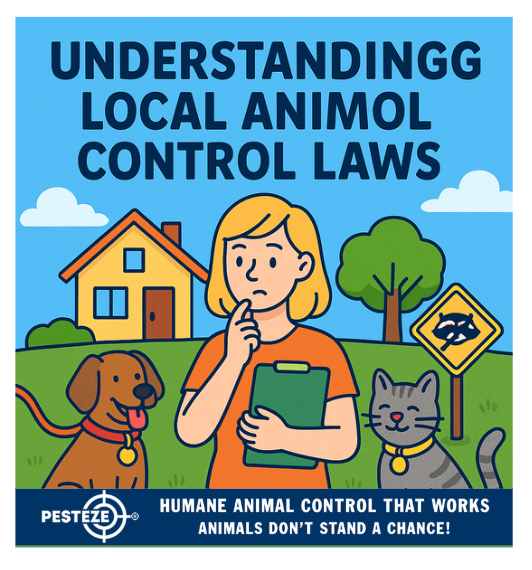UNDERSTANDING LOCAL ANIMAL CONTROL LAWS

UNDERSTANDING LOCAL ANIMAL CONTROL LAWS
SUMMARY
Animal control laws vary by city and state, but they all aim to protect communities, pets, and wildlife. This guide explains the basics of local animal control laws and why it’s important to understand and follow them.
FEATURES
-
Pet licensing rules: Registration and identification requirements.
-
Leash laws: Where and when pets must be restrained.
-
Noise ordinances: Rules about barking or disruptive animals.
-
Wildlife protections: Restrictions on trapping or relocating wild animals.
-
Vaccination mandates: Rabies and other required vaccines.
-
Reporting obligations: When and how to report cruelty or strays.
GUIDE DESCRIPTION
Every community has rules designed to manage animals responsibly, ensuring safety for both people and pets. By understanding local animal control laws, you can avoid fines, protect your pets, and support humane treatment of animals.
One of the most common requirements is pet licensing. Many cities require dogs—and sometimes cats—to be registered with the local government. This includes attaching an ID tag or microchip for identification, which helps return lost pets to their owners quickly.
Leash laws are another widespread regulation. These laws dictate that pets must be leashed in public spaces unless in designated off-leash areas. Leash laws protect not only other people and animals but also your pet from traffic or wildlife encounters.
Many areas also enforce noise ordinances, especially regarding barking dogs or other disruptive animals. Pet owners are responsible for controlling noise to maintain peace in the neighborhood.
When it comes to wildlife, protections are strict. It is often illegal to trap, relocate, or harm wild animals without a permit. Local governments emphasize humane methods for coexistence, often providing resources on deterrence and wildlife-safe practices.
Vaccination mandates are another crucial aspect of animal control laws. Rabies vaccines for dogs and cats are legally required in most regions. These rules protect both pets and the community from dangerous diseases.
Finally, reporting obligations play an important role. Residents may be legally required to report stray animals, suspected abuse, or dangerous pets. Animal control agencies use these reports to enforce laws and protect animal welfare.
By following these laws, you contribute to a safer and more compassionate community. Staying informed about your local regulations helps ensure your pets are healthy, your neighborhood is safe, and wildlife is treated with respect.
- Saneeth Thota


Comments 0